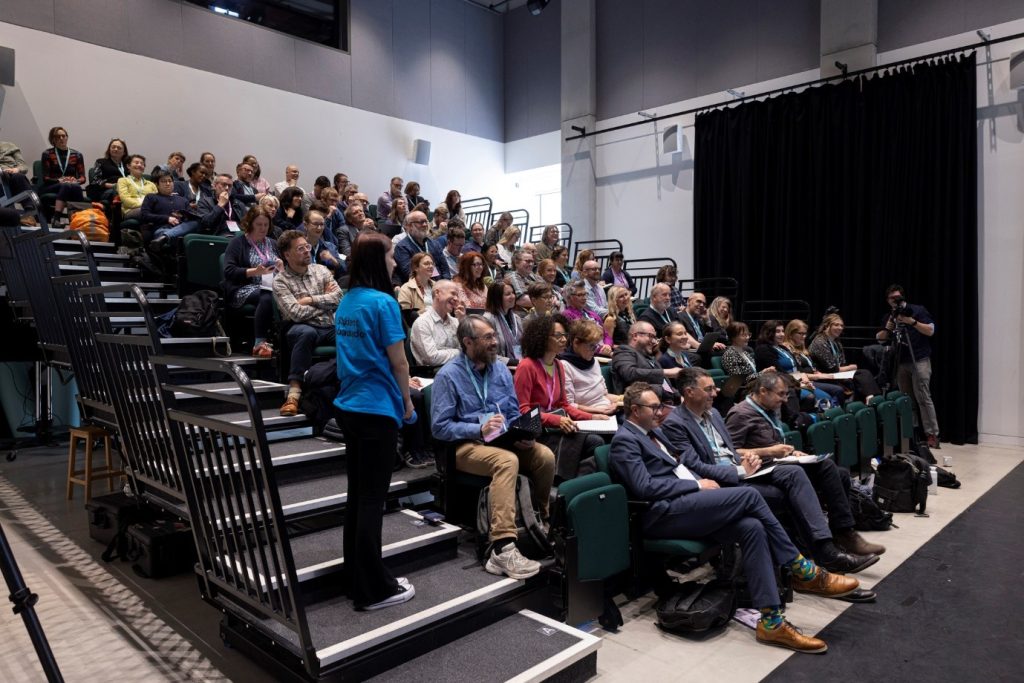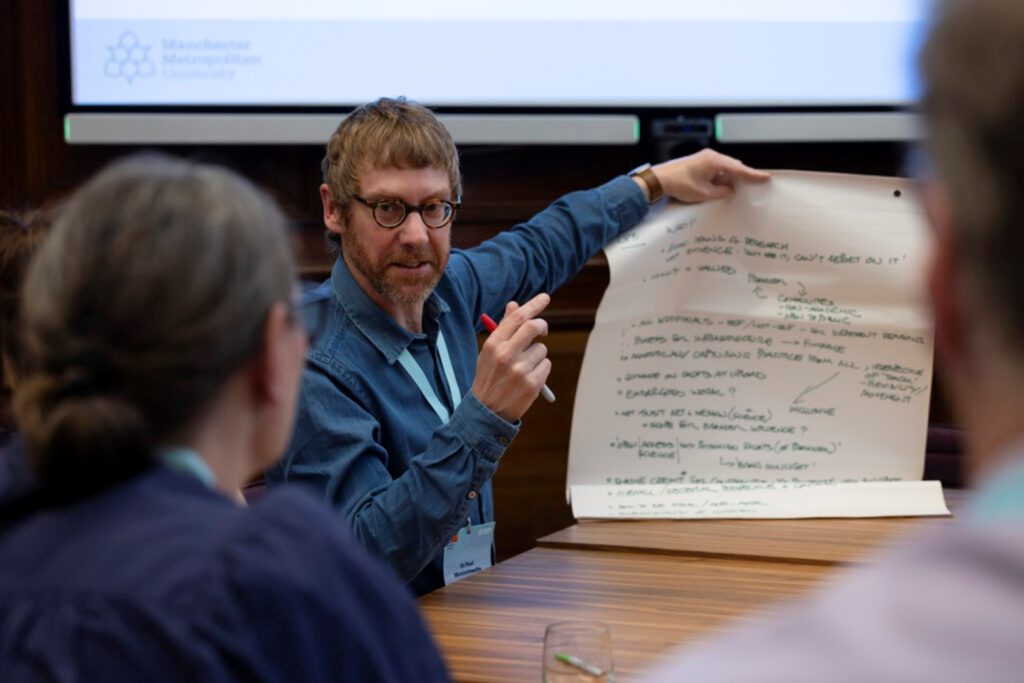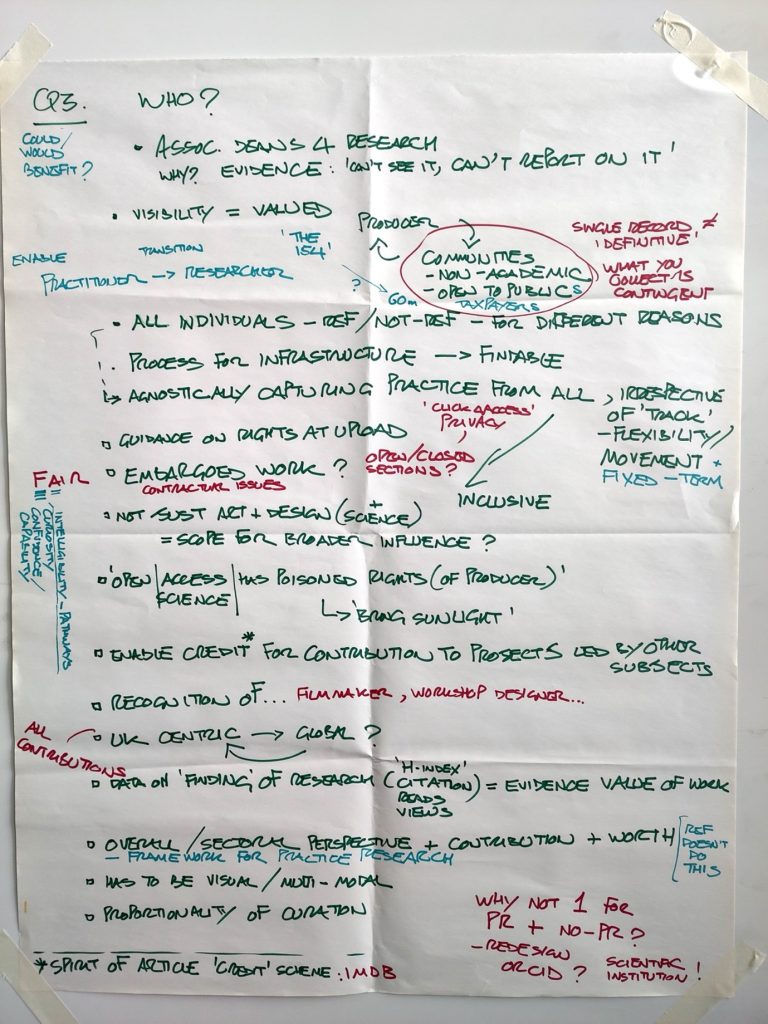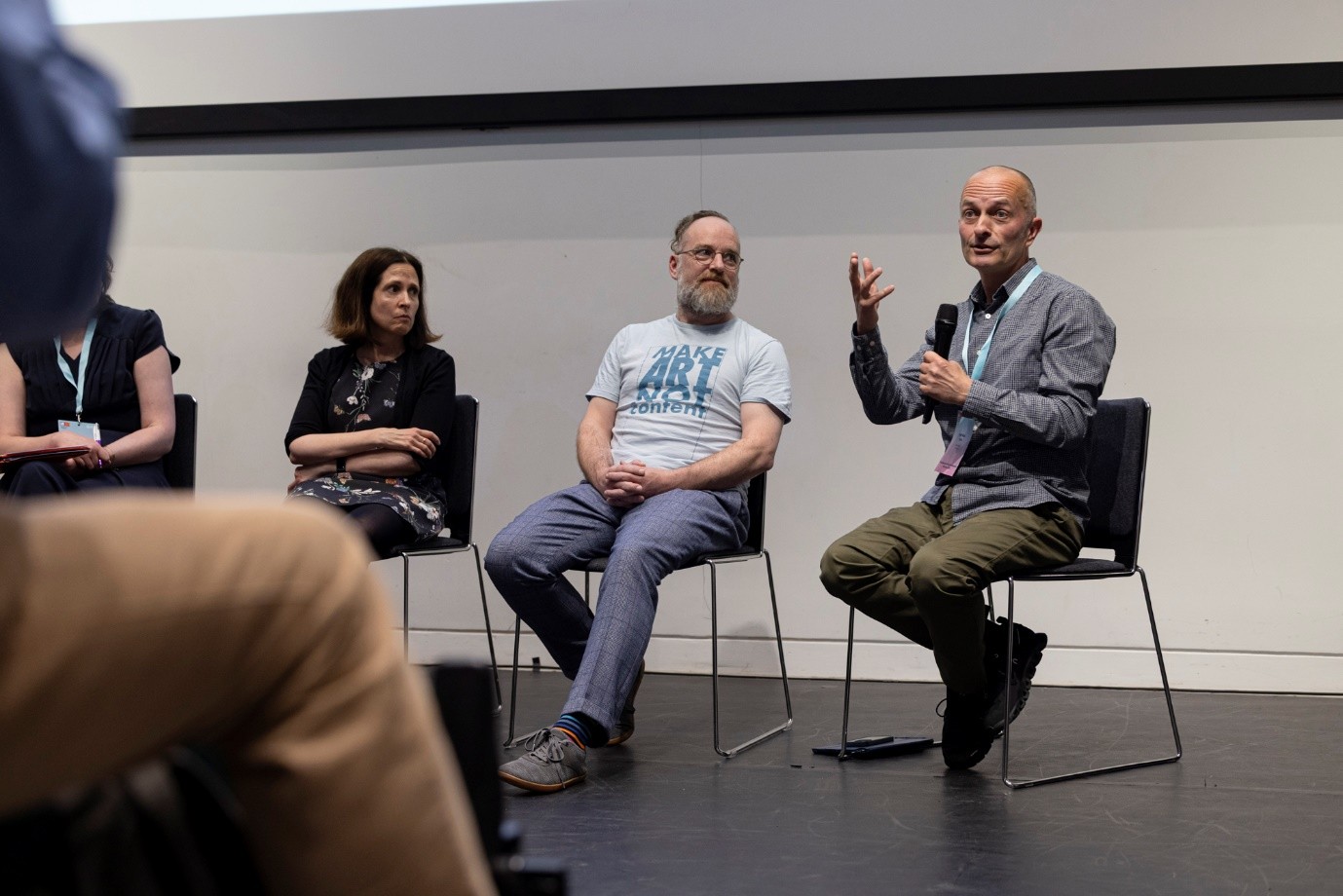Written by Victoria Barragán, Helen Darby & Paul Micklethwaite from Manchester Metropolitan University
The Future of Practice Research Symposium took place at Manchester Metropolitan University on 9th June 2025. Welcoming around 70 delegates from across the UK, the event was designed to act as national summit on issues for practice research in arts and humanities, across the Higher Education research sector.
Due to the way practice is produced and the diversity of its forms, practice research can be more challenging to present than other more traditional text-based outputs such as journal articles, collections or monographs. Recent AHRC-funded sector-wide scoping projects PR-Voices and SPARKLE have confirmed previous work and recommendations in this area from PRAG-UK, concluding that Practice Research continues to face significant challenges in terms of its identification, discoverability, visibility and parity with ‘standard’ outputs. Institutions currently respond individually to the requirement for assessment of Practice Research within assessment exercises such as REF, and the imperative of Open Access principles for the sharing of Practice Research. No standard repository system or principles of universal identification or systematic interoperability exists as yet. As such, this remains a new and developing infrastructure challenge for the entire HE sector.
In addition, staff recruited into academic contexts from practitioner backgrounds need support to be able to collate, organise and present high quality research in ways that align with the sector’s understanding of what constitutes high-quality research.
Practice Research has never been more important to the culture of our sector. With recent long awaited strategic shifts directed at recognising more diverse types of output from more diverse sorts of people, the necessity for appropriately sharing, assessing and valuing practice in all its forms, is essential and urgent.
As Open Research, Open Methods and FAIR principles become our standard practices across every field, the lessons learned and knowledge gained from arts practice – capture and dissemination of research via portfolios of iterative work; co-producing work across teams of academics, practitioners and technical staff; placing value on exploration, emergence and the potential for failure – are now the pressing concerns for everyone that is engaged with ‘new knowledge, effectively shared’.
The recent CHEAD policy briefing, ‘The Value of Art and Design Research with recommendations on REF Good Practice’, emphasises the quality of Practice Research in art and design in the last REF:
“REF 2021 saw outstanding practice research that was socially engaged, including applied work situated in a wide range of contexts, and work co-created with community partners or professionals. The sub-panel also identified world-leading practice research that demonstrated originality, rigour, and significance in aesthetic or formal terms alone.” (CHEAD, 2025, page 2)
‘Non-traditional’ research output formats are therefore being encouraged within arts and humanities research, in recognition of the strength of these modes of presenting the range and quality of Practice Research. Similar signals can be detected in other disciplinary domains. We might even foresee a portfolio-approach to presenting our research becoming the norm, in the arts and humanities and beyond.
For these reasons we could say that ‘The Future of Practice Research’ is, in fact, the future of research.
The CHEAD briefing paper argues for greater recognition of, and support for, the value of Practice Research both within and beyond academia. This requires a collective effort to “[i]nvestigate the effectiveness of institutional infrastructures to collate, curate and celebrate expanded forms of outputs and all forms of research endeavour.” (CHEAD, 2025, page 3) Hence the Symposium directly addressed questions around the notion of a national infrastructure for sharing practice research.

The event presented three talks:
- REF and Disciplinary challenges. Speaker: Rebecca Emmett (REF panel D representative from Research England)
- Charting the state of the art and where it could/should go: A co-design approach to developing research infrastructure to enable ‘FAIR’ PR. Speaker: Jenny Evans (Research Environment and Scholarly Communications Lead · University of Westminster. PI on PRVoices)
- Capturing the ephemeral: what do Practice Researchers want and need? New horizons and the future of sharing practice. Speaker: Prof Nick Fells (Professor of Sonic Practice, University of Glasgow. PRAG-UK Chair)
These were followed by a lively Q&A with the assembled audience.
A full-length video of these proceedings is available via The Future of Practice Research website.
Adding to the experience of the symposium discussions, the event also featured real practice research courtesy of Manchester Met graduating Masters students in MA/MFA Performance and MA Fine Art. Details of the students who presented work are also available on the website.

The symposium went on to host an afternoon workshop, in which delegates were facilitated in groups for a round table activity to respond to three key questions for the Practice Research community:
What do we need?
- How do you currently share your practice research?
- What do you see as the main challenges to sharing practice research?
How does it work?
- What would a functional national infrastructure for sharing practice research need to include?
- How could it enable connections between communities of interest, e.g. practice research, professional practice and public engagement, innovation, etc.?
Who would benefit?
- What (and whom) could benefit from this infrastructure (both within and outside academia)?
- What would success look like for them?
The workshop sought to explore and discuss the Practice Research agenda together, and plan for the next steps for Practice Research infrastructure and support. Facilitators from Manchester Met’s Practice Research Support Working Group assisted the flow of each group in responding to each question and led notetaking of the discussion. Each group’s discussion notes were then presented to the combined symposium audience, stimulating further collective discussion.


These notes and discussions will now feed into a forthcoming Practice Research position paper, to be launched at a further event in September 2025. This position paper will credit all participants of the workshop as contributors and will be the main tangible output from the day. It is intended to further the Practice Research agenda and enable future networking and collaboration amongst the Practice Research community. You can sign up to receive updates via the Manchester Met Practice Research Team at AHPRS@mmu.ac.uk
This event was supported by Research Culture development funding from Research England.
Victoria Barragán – Practice Research Support Manager, Manchester Met
Helen Darby – Research Impact Manager, Manchester Met
Paul Micklethwaite – Department Research Lead for Design, Manchester Met
Photography by David Oates
Reference:
CHEAD (2025) ‘The Value of Art and Design Research with recommendations on REF Good Practice. Policy briefing for Vice Chancellors, Pro Vice Chancellors Research and Research Staff.’ March.

